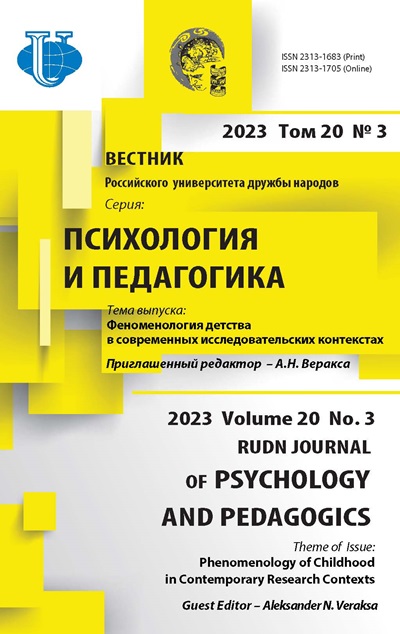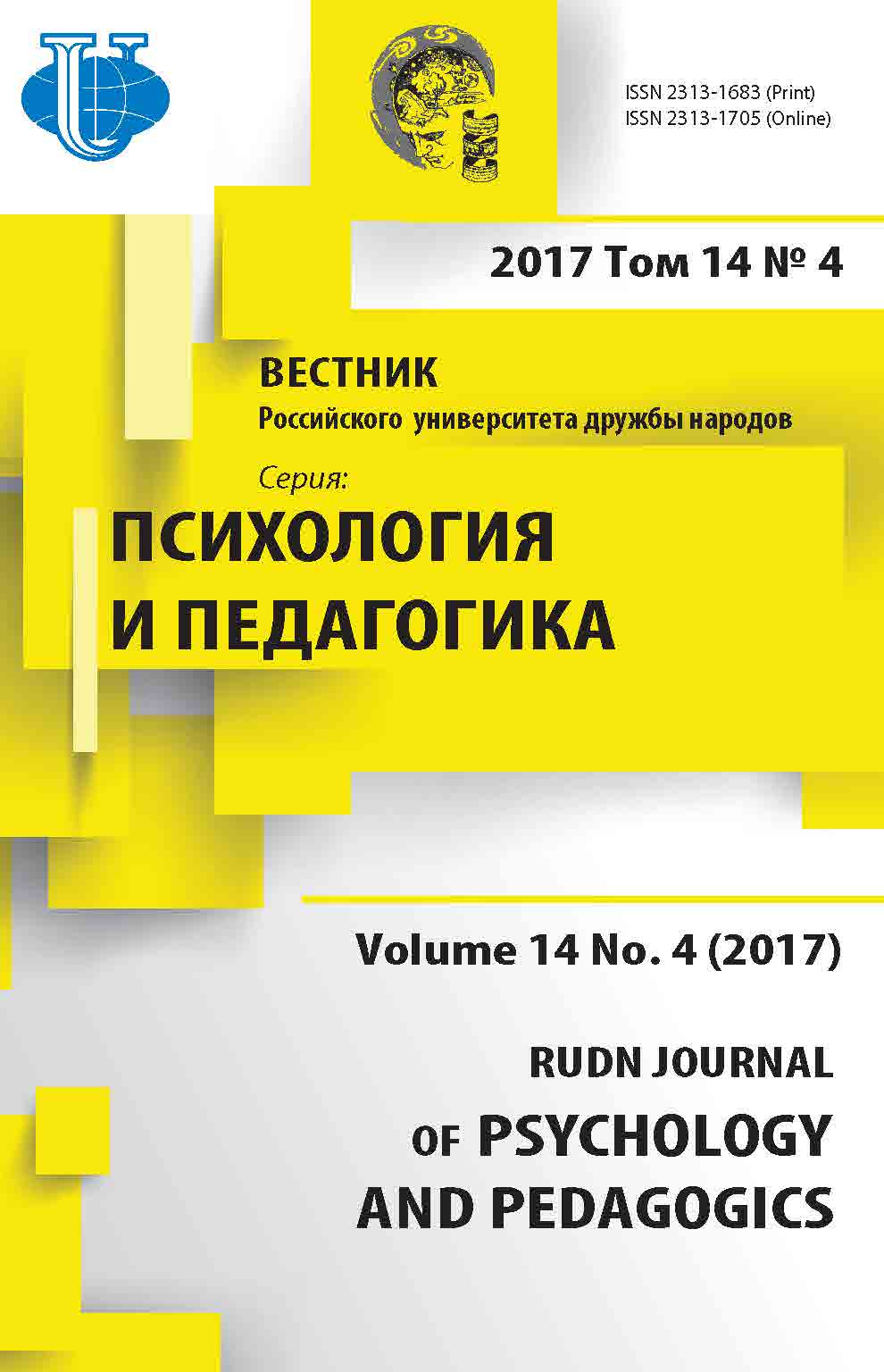THE STUDENTS’ REPRESENTATIONS OF CIVIL SERVANTS’ NORMATIVE ORIENTATION
- Authors: Oboznov A.A1, Gerasimova A.S2, Bessonova Y.V1, Aguzumtsyan R.V3, Petrosyan L.A3
-
Affiliations:
- Institute of Psychology, Russian Academy of Sciences
- The National Research University “Belgorod State University”
- Public Administration Academy of the Republic of Armenia
- Issue: Vol 14, No 4 (2017)
- Pages: 400-412
- Section: Articles
- URL: https://journals.rudn.ru/psychology-pedagogics/article/view/17255
- DOI: https://doi.org/10.22363/2313-1683-2017-14-4-400-412
Cite item
Full Text
Abstract
The concept of the normative personal orientation seeks to specify how personnel motivation should be organized in the value-motivational sphere for professional activity execution in accordance with its social purpose. Based on the priority of the civil service social purpose, the hierarchical structure of the personal normative orientations was theoretically validated. Social motives related to serving for the benefit of the Fatherland as well as work motives associated with the achievement of some role positions are the major motives. The subordinate motives are the monetary rewards and self-development. Development of the future civil servants’ orientation is based on a conscious idea about the required motives’ subordination, that is, about the normative civil servant’s orientation. The study involved 63 students of the 2nd and 4th year studying at the Russian management institute in the specialty “Customs” and 51 students of the 1st and 2nd year studying at the Public Administration Academy of the Republic of Armenia, as well as 4 experts (two from Russia and Armenia) having long-term experience in the civil service. The method is an author’s closed-questions’ inventory containing a list of 18 personal goals, that should guide the civil servant in professional work. The instruction required the selection of five most important goals. An absolute majority (from 66 to 90%) of Russian and Armenian students has the motives’ subordination that is inconsistent with the normative orientation. According to the students’ view, self-development, self-creation and material benefit are the leading motives of a civil servant. The expert motives’ representations are identical to the required content of civil servant normative orientation. The authors defined the need to develop a special psychological and educational program for promoting required representations about the normative orientation of future civil servants.
About the authors
Alexander A Oboznov
Institute of Psychology, Russian Academy of Sciences
Author for correspondence.
Email: aao46@mail.ru
Alexander A. Oboznov - Doctor of Psychology, Professor, Leading Researcher of Laboratory of the labor psychology, ergonomics, engineering and organizational psychology, Institute of Psychology of the Russian Academy of Sciences (Moscow, Russia).
Yaroslavskaya str., 13, Moscow, Russia, 129366Alexandra S Gerasimova
The National Research University “Belgorod State University”
Email: agerasimova66@mail.ru
Alexandra S. Gerasimova - Ph.D. in Psychology, Head of Chair of Age and Social Psychology of Belgorod State National Research University (Belgorod, Russia).
Pobedy str., 85, Belgorod, Russia, 308007Yulia V Bessonova
Institute of Psychology, Russian Academy of Sciences
Email: farandi@mail.ru
Yulia V. Bessonova - Ph.D. in Psychology, Associate Researcher of Laboratory of the labor psychology, ergonomics, engineering and organizational psychology, Institute of Psychology of the Russian Academy of Sciences (Moscow, Russia).
Yaroslavskaya str., 13, Moscow, Russia, 129366Ruben V Aguzumtsyan
Public Administration Academy of the Republic of Armenia
Email: rvaghuzumtsyan@list.ru
Ruben V. Aguzumtsyan - Ph.D. in Psychology, Professor, Head of Chair of Psychology of Management of the Public Administration Academy of the Republic of Armenia (Erevan, Armenia).
8 Kievyan str., Yerevan 0028, RA, 375028Laura A Petrosyan
Public Administration Academy of the Republic of Armenia
Email: laur-armen@mail.ru
Laura A. Petrosyan - Ph.D. in Psychology, Associate Professor of Chair of Psychology of Management of the Public Administration Academy of the Republic of Armenia (Erevan, Armenia).
8 Kievyan str., Yerevan 0028, RA, 375028References
- Bessonova, Yu.V., & Oboznov A.A. (2016). Normativnaya napravlennost’ professionala kak sootnosheniye trebovaniy organizatsii, deyatel’nosti, individual’nosti. In: V.A. Barabanshchikov (Ed.), Protsedury i metody eksperimental’no-psikhologicheskikh issledovaniy (pp. 860—868). Moscow: Institut psikhologii RAS Publ. (In Russ.).
- Bozhovich, L.I. (1968). Lichnost’ i yeyo formirovaniye v detskom vozraste. Moscow: Prosveschenie. (In Russ.).
- Derkach, A.A. (2001). Aktualizatsiya potrebnosti v lichnostno-professional’nom razvitii gosudarstvennykh sluzhashchikh. Moscow: RAGS Publ. (In Russ.).
- Derkach, A.A. (2004). Psikhologiya professional’noy deyatel’nosti: Lektsii v pomoshch’ prepodavatelyu. Moscow: RAGS Publ. (In Russ.).
- Gerasimova, A.S. (2013). Value-normative method of evaluation of educational motivation of students. Experimental Psychology (Russia), (4), 96—104. (In Russ.).
- Karabushchenko, N.B. (2016). Psikhologiya professional’nykh elit v vuze. St. Petersburg: Alef-Press. (In Russ.).
- Leontiev, A.N. (1975). Deyatel’nost’. Soznaniye. Lichnost’. Moscow: Politizdat. (In Russ.).
- Oboznov, A.A. (2014). Napravlennost’ lichnosti professionala: normativnyy podkhod. In: L.G. Dikaya, A.L. Zhuravlev (Eds.). Lichnost’ professionala v sovremennom mire. Moscow: Institut psikhologii RAS Publ. (In Russ.).
- Oboznov, A.A., Bessonova, Yu.V., Gerasimova, A.S., Aguzumtsyan, R.V., & Petrosyan, L.A. (2016). Problema normativnoy napravlennosti sub”yekta truda. Psikhologiya razvitiya cheloveka kak sub”yekta truda. Razvitiye tvorcheskogo naslediya Ye.A. Klimova. Conference Proseedings (pp. 46—49). Moscow: Akropol’ Publ. (In Russ.).
- Rubinshtein, S.L. (1976). Puti i dostizheniya sovetskoy psikhologii (O soznanii i deyatel’nosti cheloveka). In: S.L. Rubinshteyn. Problemy obshchey psikhologii (pp. 135—157). Moscow: Pedagogika Publ. (In Russ.).
- Zalessky, G.Ye. (1994). Psikhologiya mirovozzreniya i ubezhdeniy lichnosti. Moscow: MGU Publ. (In Russ.).
















